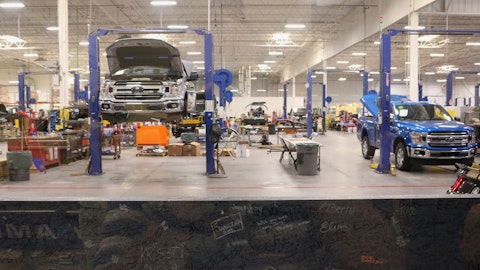Group 1 Automotive, Inc. (NYSE:GPI) Q4 2022 Earnings Call Transcript January 25, 2023
Operator: Good morning, ladies and gentlemen. And welcome to Group 1 Automotive’s 2022 Fourth Quarter and Full Year Financial Results Conference Call. Please be advised today’s conference call is being recorded. At this time, I’d like to turn the conference call over to Mr. Pete DeLongchamps, Group 1’s Senior Vice President of Manufacturer Relations, Financial Services and Public Affairs. Please go ahead, Mr. DeLongchamps.
Peter DeLongchamps: Thank you, Jamie. And good morning, everyone, and welcome to today’s call. The earnings release we issued this morning and a related slide presentation that include reconciliations related to the adjusted results we will refer to on this call for comparison purposes have been posted to Group 1’s website. Before we begin, I’d like to make some brief remarks about forward-looking statements and the use of non-GAAP financial measures. Except for historical information mentioned during the conference call, statements made by management of Group 1 Automotive are forward-looking statements that are made pursuant to the Safe Harbor provisions of the Private Securities Litigation Reform Act of 1995. Forward-looking statements involve both known and unknown risks and uncertainties, which may cause the company’s actual results in future periods to differ materially from forecasted results.
Those risks include, but are not limited to, risks associated with pricing, volume, inventory supply due to increased customer demand and reduced manufacturing production levels due to component shortages, conditions of markets and adverse developments in the global economy and resulting impacts on the demand for new and used vehicles and related services. Those and other risks are described in the company’s filings with the Securities and Exchange Commission. In addition, certain non-GAAP financial measures, as defined under SEC rules, may be discussed on this call. As required by applicable SEC rules, the company provides reconciliations of any non-GAAP financial measures to the most directly comparable GAAP measures on its website. Participating with me today on the call Daryl Kenningham, our President and Chief Executive Officer, and Daniel McHenry, Senior Vice President and Chief Financial Officer.
I’ll now hand the call over to Daryl.
Daryl Kenningham: Thank you, Pete. Good morning, everyone. 2022 was a record year for Group 1 Automotive, driven by outstanding aftersales growth, strong margins, all-time record profitability in our UK operation and disciplined expense control. Adjusted net income grew 15% to a record $729 million. Adjusted EPS grew 32% to an all-time high of $45.71. 2022 was also another strong year of external growth for Group 1. We acquired nearly $1 billion of revenue in 2022 and have now acquired over $3 billion in revenues over the past 15 months. We also returned meaningful capital to our shareholders by repurchasing $521 million in shares during the calendar year. Over the past 15 months, we’ve now repurchased over 22% of the company’s outstanding shares.
Our strong cash flow and leverage position, which Daniel will cover in a moment, will continue to allow for significant capital allocation flexibility in 2023. Turning to our fourth quarter results. I’m pleased to report that, for the quarter, Group 1 generated adjusted net income from continuing operations of $158 million or $10.86 per diluted share in EPS, an increase of 15% over the fourth quarter last year. Our adjusted results exclude non-core items totaling $1.7 million of after tax losses, which primarily resulted from the pending disposition of two US franchise points. Starting with our US operations. As of December 31, we had 8,000 new vehicles in inventory, representing a 21-day supply, up 6 days from September. This inventory increase was primarily in our domestic brands as import brands remained very constrained.

Photo by Swansway Motor Group on Unsplash
30% of our US business is Toyota and Lexus, which continues to be very tight at a combined 4 days’ supply. We expect a gradual decline in new vehicle margins over the course of 2023 as inventory continues to recover. We do, however, expect normalized new vehicle margins to eventually settle above our pre-pandemic levels. One of the continued challenges we faced in the quarter was a decline in industry used vehicle pricing, which results in a used vehicle sequential margin decline of $235 to roughly $1,350. Partially offsetting this was an 8% increase in same store used vehicle unit sales. Our organic sourcing efforts, including the acquisition of over 10,300 vehicles from individuals through AcceleRide continued to minimize our reliance on public auctions.
We maintained our discipline with a 28 day supply of used inventory, which is within our target of 30 days. And the F&I business has remained strong at $2,369 per unit, showing only a minimal sequential decline. Looking forward, we do expect some modest headwinds due to pressure on finance penetration rates. Turning to aftersales, our US performance was outstanding once again, generating double-digits same store revenue growth, following high teen growth comps a year ago. Our customer pay business generated 13% same store growth. Collision increased 14%, warranty 8% and wholesale parts 3%. Through our technician recruiting and retention efforts, we increased our same store technician headcount by 16% in 2022. We foresee after sales continuing to be a strength over the course of 2023 for Group 1.
We continued to maintain cost discipline, despite the decline in new and used vehicle markets. Our fourth quarter US adjusted SG&A as percentage of gross profit was 61%, an increase of only 1 percentage point from the prior year and down from 71% in pre-pandemic 2019. A material portion of these cost savings will be permanent as we continue to leverage technology to drive customer and employee efficiencies. In the fourth quarter, we sold an all-time record 10,100 vehicles through AcceleRide, 15% of our total US retail sales, also an all-time record. Over 75% of our customers used AcceleRide in their transaction in some way in the fourth quarter, a percentage that continues to increase. We’re also looking to our full integration of AcceleRide with our DMS, CRM and credit software.
We continue to test it in several dealerships and expect a full rollout this year. Our early results are very positive, and we expect this will provide faster and more transparent transactions for our customers. Now turning to the UK. Vehicle demand remains steady and new vehicle availability is still constrained. Our new vehicle order bank at year-end was approximately 16,000 units, over six months’ worth of sales, which remained fairly consistent with the prior quarter. As a reminder, our UK business mix is predominantly luxury. And those consumers are more resilient during times of economic uncertainty. We continue to believe that pent up demand built over the past several years due to both Brexit and a very strict pandemic lockdowns will help drive strong UK vehicle demand throughout 2023.
Our aftersales growth in the UK has been just as strong as the US, with same store gross profit growth on a local currency base of 13% for both the fourth quarter and the full year of 2022. And finally, we expect the AcceleRide platform in the UK to be fully integrated in the second quarter of this year. Now to provide a balance sheet and liquidity overview, I’ll turn the call over to our CFO, Daniel McHenry.
Daniel McHenry: Thank you, Daryl. And good morning, everyone. As of December 31, we had $48 million of cash on hand and another $154 million invested in our floorplan offset accounts, bringing total cash liquidity to $202 million. We also had $437 million available to borrow on our acquisition line, bringing total immediate available liquidity to $639 million. In 2022, we generated $916 million of adjusted operating cash flow and $803 million of free cash flow after backing out $113 million of CapEx. This capital was deployed through a combination of acquisitions, share repurchases and dividends. In 2022, we spent $521 million, repurchasing approximately 3 million shares at an average price of $172.54. And in the month, we spent an additional $13.7 million, repurchasing 76,300 shares.
The result of this repurchase activity is just over a 22% reduction in our share count over the last 15 months. Our share count as of today is down to approximately 14.2 million. Our rent adjusted leverage ratio as defined by our US syndicated credit facility was 1.9 times at the end of December. Our strong balance sheet will continue to allow for meaningful and balanced capital deployment. Our quarterly floorplan interest of $9.6 million was an increase of $2.4 million due entirely to higher vehicle inventory holdings. Non-floorplan interest expense of $22 million increased $6 million from prior year, both due to the debt rates in conjunction with the prime acquisition as well as higher interest rates. As a reminder, the majority of our debt has been fixed through interest rate swaps.
As of December 31, approximately 70% of our $3.1 billion in floorplan and other debt was fixed. Therefore, an annual EPS impact is only about $0.50 for every 100 basis point increase in the secured overnight funding rate, which is the benchmark rate referenced in our floorplan and mortgage debt instruments. For additional detail regarding our financial condition, please refer to the schedules of have additional information attached to the news release, as well as the investor presentation posted on our website. I will now turn the call back over to Daryl.
Daryl Kenningham: Thank you, Daniel. Related to our corporate development efforts, we expect to find additional growth opportunities in 2023. Growing our US and UK businesses remains our top capital allocation priority. However, our balance sheet, cash flow generation and leverage position will continue to support a flexible capital allocation approach, which will likely also include serious consideration of share purchases. This concludes our prepared remarks. I will now turn the call over to the operator to begin the question-and-answer session. Operator?
See also 15 Biggest Natural Gas Pipeline Companies in the World and 13 Biggest Eyewear Companies in the World.
Q&A Session
Follow Group 1 Automotive Inc (NYSE:GPI)
Follow Group 1 Automotive Inc (NYSE:GPI)
Receive real-time insider trading and news alerts
Operator: . And our first question today comes from John Murphy from Bank of America.
John Murphy: I have to one core question and one follow-up. Just on new GPUs, Daryl, you mentioned you expect them to normalize over time, but still be higher than they were pre-pandemic. I’m just curious, what timeframe you think that happens in. I know that’s a tough question, but if you could give us sort of some idea of your thought process there. And then also just the corollary savings on SG&A that that just falls out as grosses come down, meaning what part of that goes out to sales comp? So, is there sort of just a natural sort of hedge or savings as those GPUs come down?
Daryl Kenningham: John, this is Daryl. I can’t tell you with any specificity when we think it will normalize, other than what we’ve seen is a real steady glide path really since middle of last year, the gross profits decline, and we expect we’ll see something similar through this year. And in some brands, our grosses are holding up quite well because they’re still very tight. Inventories are still very tight. In a couple of brands, we saw the gross has increased during the quarter. And then, in a couple of brands that we got quite a bit of inventory. In our domestics, we saw the most erosion. But I can’t give you a specific time, other than as the inventories and total come back, we expect it to be a gradual change. I’ll ask Daniel to address the SG&A question.
Daniel McHenry: On SG&A, or our infills expense in particular, John, which I think you’re referring to, I think there’s a couple of things out there that’s really going to help us going forward. And, clearly, the reduction in profitability drives SG&A as a percent of growth, but I think our use of the AcceleRide platform, how we’ve integrated that into our dealerships, and I think, importantly, the integration that we’re going through, integrating AcceleRide or DMS, CRM and credit software, that’s going to help us further increase the utilization of our sales executives going forward. And I think some of that will help reduce that SG&A impact going forward.
John Murphy: Just one kind of follow up on parts and service. You said 16% growth in techs in 2022. Am I correct to read the gating factor on same store sales growth in parts and service is those techs and what was sort of the cadence of the hiring of those techs through the course of the year? Because if you kind of assume they happen during the course of the year, you might, on a same store basis, have 8% more techs in 2023 versus 2022, right, assuming half were €“ they were hired smoothly through the year. Just kind of understand that cadence, so we can think about where at even capacity sits right now.
Daryl Kenningham: We picked up more in the second half of the year than we did in the first half, John. And I expect, as they get assimilated €“ our belief is adding capacity in aftersales drives our ability to service more customers when they want to do business with us. And so, I expect will see that ability with these technicians we’ve added in 2023. And we’re continuing to press to hire more techs beyond the number that you see there as well.
Operator: Your next question comes from Michael Ward from Benchmark.




